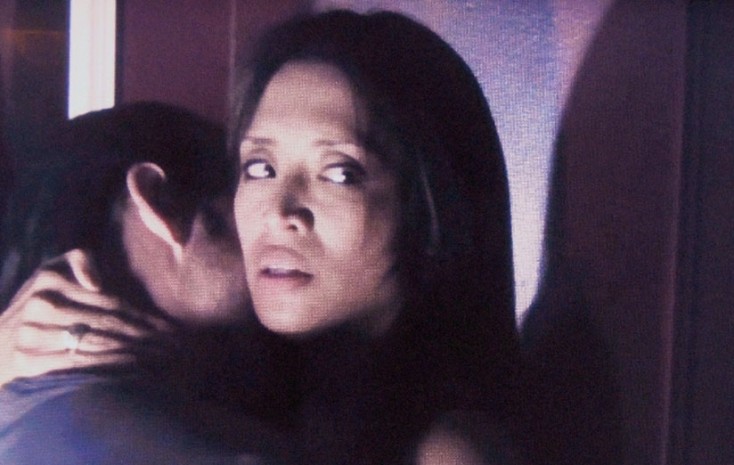By ANGELA DAWSON
Front Row Features
HOLLYWOOD—Chuti Tiu is a talented and versatile actress who has guest starred on TV shows including “24,” “Weeds,” “The Closer” “Southland” and “Days of Our Lives,” to name a few, as well as the Sally Field-directed dramedy “Beautiful,” along with supporting roles in the Vince Vaughn-Owen Wilson comedy “The Internship,” and the police drama “Rampart,” starring Woody Harrelson.
Frustrated by the stereotypical portrayal of Asians in mainstream media, Tiu wrote a screenplay that reflects what she perceives as a more accurate and layered depiction of Asian-American culture. “Pretty Rosebud” is a drama that explores the traditional roles of women in Asian-American culture and what happens when they defy expectations.
In “Pretty Rosebud,” Tiu plays Cissy, a public relations professional, who is trying to be everything to everybody. She supports her husband, whose career as an architect has nose-dived, and he seems less and less inclined to look for work. Meanwhile, she tries to placate her critical parents and be a good sister to her only brother. With personal and professional responsibilities starting to overwhelm her, Cissy finally indulges her herself, and realizes for the first time that she needs to look after her own needs above all else.
Despite the odds of getting a little indie film made, with an Asian-American character at the center of the story no less, Tiu won support for the project, in which she also stars. Helmed by her husband, actor Oscar Torre, making his directorial debut, “Pretty Rosebud” premiered at the Reel World Film Festival in Toronto earlier this month, and it is rolling out in theaters around the U.S. in the coming weeks.
Born in Milwaukee, Tiu was raised in the Midwest with a strong work ethic. She attended Northwestern University, where she majored in economics and political science. During that time, she dreamed about becoming an actress, but the university frowned on non-theater arts majors auditioning for roles and taking acting classes. A natural beauty, she entered pageants and was the first non-Caucasian to win the title of America’s Junior Miss. Later, she was Miss Illinois in the Miss America pageant, where she won a talent award with her classical piano performance.
After nearly two decades in show business, Tiu says she is proud to add “screenwriter” to her list of achievements.
Q: What inspired you to write “Pretty Rosebud?”
Tiu: I write like I cook. I figure out what ingredients and tastes I want to incorporate, then throw it all together and see what happens. I wanted to tell a story that I hadn’t seen often in movies or on television, that broke certain stereotypes about women, men, and Asians in particular—one that shows the difficult road that a marriage can take, and how there’s no one reason why a relationship turns sour. There were a lot of elements I wanted to include, like the strange limbo first- and second-generation Americans can find themselves in as Cissy, the main character in “Pretty Rosebud,” does, trying to combine American culture and that of their heritage. There’s also what can happen when the economic tables are turned and it’s the wife who is earning more or supporting the husband—the resentments, the backlash.
Q: What was the biggest challenge for you?
Tiu: One thing I had to address was the differential treatment in stories that men and women can get when it comes to sex. I would get sick and tired of seeing stories where the wife/girlfriend was cheated on, over and over, and I’d think to myself, “Yeah, right, like women never cheat.” It’s as if women aren’t allowed to have libidos. Why is it that if a woman likes sex and sleeps around, she’s a slut; a man does it, and he’s a stud? He’s “got game?” I just had to tell a story that swung the pendulum in the opposite direction a little bit. The bottom line is that human beings have libidos, and both men and women have to be responsible, be honest and do no harm.
Q: What have you found to be the secret to a happy marriage, especially with both you and your husband being actors?
Tiu: I don’t know about the “secret,” but I do know that we constantly work at it. We definitely go through our ups and downs, but through it all, there’s a deep and growing love, coupled with commitment to making it work, and communication. Oh, and forgiveness. Grudges are not effective; this one I’m working on. Each of us was married once before, and we’ve learned from those experiences. I think every couple develops a blueprint for their particular relationship. It might not work for everyone, and it doesn’t have to. It just has to work for that couple. When one of us feels like something is off, we communicate and see if we have to alter or clarify the blueprint. I have to say, I feel so blessed to have him as my husband. He’s literally my life playmate.
Q: How did your involvement with pageants help you in your career?
Tiu: People sometimes say that acting is so tough because there’s so much rejection. But in pageants, you’re so much more vulnerable because you’re not putting forth a made-up character in a story; you’re showing yourself, your beliefs, your body, your talent—you. Take that for rejection. Having gone through pageants helped put acting auditions in perspective. I remember being a pageant judge a few times, and there were times when I really liked a contestant, but she wasn’t right to represent that particular pageant. It’s the same way in show business. It’s not personal. It’s not a judgment on you. You just might not be right for a particular role, but you’ll be awesome for a different one.
Q: When did you know you wanted to be an actress?
Tiu: I sat in on Professor Bud Beyer’s acting class (at Northwestern) and knew I just had to sign up. I thought, “I wanted to study this!” So I camped outside his door. Bud was really popular, and before registration, people camped outside his door in sleeping bags the way they do for concert tickets or the latest iPhone. I was third in line, and I pleaded with him to let me in his class, but I wasn’t a theater major. I was double majoring in political science and economics. He all but kicked me out of his office, saying that there was no way he was letting in a non-theater major into his class, when so many theater majors wanted in. It totally made sense. I was extremely disappointed, but took as many Performance Studies classes as possible. They jointly focused on analysis and performance of literature, and didn’t require me to be a theater major. This was my compromise, since I knew I couldn’t change my majors. My parents would’ve hit the roof if I’d gotten a major in something as non-sensible as theater.
Q: Are you working on another screenplay?
Tiu: I don’t like to talk too much about it, since it’s all just glimpses and ideas floating around in my brain, but I’ve been stricken by the idea of death and how it’s such an odd, jarring concept for us to comprehend. When death comes, the fact is that we have no control and sometimes no warning. In this day and age, we have DVRs to rewind, Photoshop to correct images, so much technology to alter our perception or experience of things. But death—it’s quite traumatic. How do we make sense of it? How can we heal? In the past year, I’ve lost two beloved cats, Adobo then Mojo. Each time, we had them put to sleep, and it felt so profoundly sad to be holding them one moment, communicating love and goodbyes and seeing life in their eyes, to having them gone, and all that’s left is a body, molecules, fur, bones and flesh. It’s something along those lines.
Q: Is there more “24” in your future?
Tiu: “24” was a lot of fun, and I have to admit, once I worked on it, that’s when I became a fan. I would love more “24” in my future.





